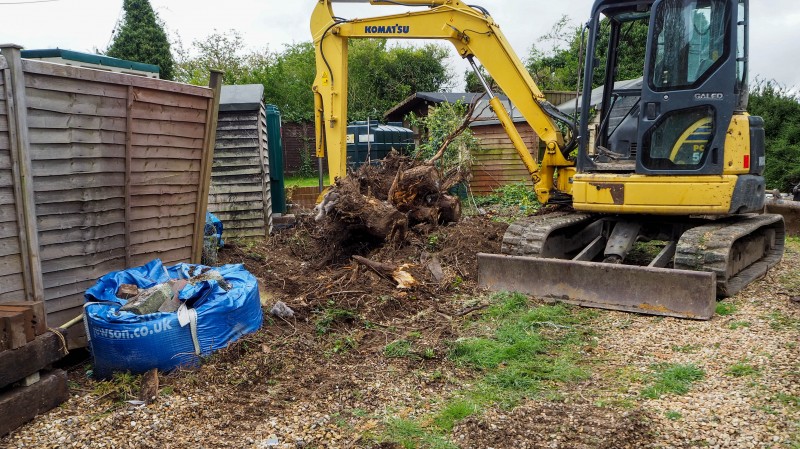You are here: What is a ground stability search and why do I need it?
These searches will provide you with information about any ground instability risks to your property from either natural or man-made hazards.
Subsidence can be caused by shrink swells due to different soil types, drainage patterns or man-made disturbances. Where subsidence is a risk to your property it will present a problem with insurability and lending. Insurance companies and lenders have access to the same data that is contained within one of these reports, or searches, and they will base their decisions on the data they find.
Natural hazards like shrink-swells and landslides can occur anywhere in the UK, depending on the geology of the land.
Man-made hazards include mineral extraction of any kind: coal, brine, limestone, clay or Bath Stone, for example.
Increased dramatic weather conditions in this country have led to more instances of voids opening up near homes. Slips and sink holes can render a property inaccessible, unstable and, in severe cases, worthless. So, it is vital that you order a search that contains some type of ground stability assessment wherever you are buying in the UK.

Are they mandatory?
Yes, unless you are buying without a mortgage. When you are buying with a mortgage, the conveyancing solicitor has to follow a set of standard instructions defined in The UK Finance Mortgage Lender’s Handbook.
The handbook comes in two parts, the first part applies to all UK Finance members –members of the organisation represent 97% of lending in the UK.
Part 2 contains a section for each member, detailing their requirements. This is where your conveyancer will find the list of which searches are required by your lender. In most cases the minimum required will be:
- Land registry searches (both Register and Title Plan)
- Local search - either Regulated or Council (both LLC1 and CON29)
- Water and Drainage - Regulated or CON29DW
- Environmental (likely to contain an element of ground stability assessment)
Further reports required include (but aren’t limited to):
- Flood
- Coal
- Cheshire Brine
- Limestone
- China and ball clay
- Tin
- Bath stone
- Radon gas
- Chancel repair liability reports (if the last purchase was before 12/10/13)
- Canal and river search
- Planning reports
- Highways
When are they ordered?
These searches should be ordered as soon as you appoint your conveyancing solicitor. One of the first things they will do is ask you for some money on account in order to pay for this and a number of other searches.
They will always order Water and Drainage and Environmental Searches as well as Official Copies from the Land Registry in the earliest stages of the process. They may also recommend that other searches are advisable such as: Flood, Chancel, Mining or any others mentioned above.
Your solicitor is the professional so trust their recommendations, even if you think it’s crazy to do a flood search when you’re on the top of a hill. For more information on any of these searches, have a look at our other articles.
These searches are in the list of searches that should be ordered as soon as you appoint your conveyancing solicitor: as a minimum this includes Land Registry and Local Searches, Water and Drainage Searches, an Environmental Search, a Flood Risk Report and any specifically required searches based on geography, such as Radon Gas, Mining or China Clay searches.
One of the first things your conveyancer will do is ask you for money ‘on account’ to pay for these searches.
Are there different types?
Yes. Ground stability, subsidence, mining and environmental reports all include a ground stability element. All four main providers of environmental searches provide a ground stability assessment within an environmental report or bundled with another type of search, such as mining. They also offer more specialist searches that may be required if a risk is identified.
What do they tell you?
They are likely to contain information on the following:
- Information on activities including coal, tin, clay, brine and gypsum extraction
- Historical and existing surface and underground workings for said mining activities
- Current and historic landfill sites
- Potential for natural ground subsidence
- Guidance if risk is identified
- Insurance
What do they cost?
This depends on the provider that your conveyancing professional uses. Any ground instability risk is likely to be flagged in an environmental report. Some search providers will include a ground stability element within another search, such as a Coal Mining and Ground Stability Report.
Depending on the level of risk identified, your conveyancing professional may advise you to pay for a specific Ground Stability Report as well. The cost is likely range from £27 plus VAT upwards.
How long do they last?
When acting on a conveyance, your solicitor must follow The UK Finance Mortgage Lender’s Handbook, it says that searches must be no more than 6 months old on completion.
A lot can change in a short space of time with property so, even if this wasn’t the case, it’s important that the information you have about the house you’re buying is as up to date as possible. Your conveyancer will let you know if the search is coming close to expiry but hopefully, because the average conveyance takes about three months, you should be ok.
If you are thinking of buying or selling your home, you may find some of these services useful:
Conveyancing
Get instant estimates from Conveyancers and Solicitors in your local area
Mortgage Brokers
I need help getting a mortgage
Estate Agent
Find a local Estate Agent
Valuation Surveys
If you need a Valuation Survey
Building Surveys
I want a local surveyor to do a Building Survey for me
Removals
I want to find a removal company
Energy Performance Certificate
Energy Performance Certificates